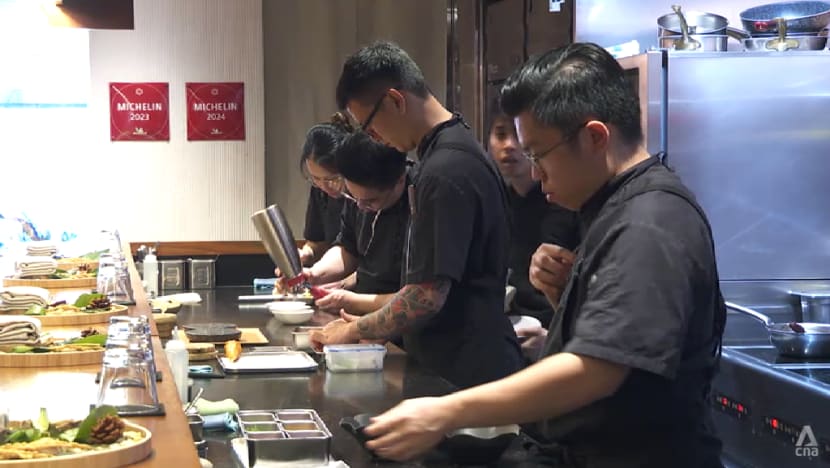Top Stories
Michelin Stars Alone Won’t Ensure Success in Singapore’s Dining Scene

As Singapore prepares to unveil its latest list of Michelin-starred restaurants on July 24, 2023, the event raises questions about the broader dynamics of the city’s food and beverage (F&B) industry. While a Michelin star is a prestigious accolade, it does not guarantee success in the highly competitive dining landscape of Singapore.
The Michelin Guide has been instrumental in shaping the culinary scene since it was first introduced to Singapore in 2016. Restaurants that receive a star often experience a surge in customer interest. Yet, the reality is that many establishments struggle to maintain their momentum even after being awarded this coveted recognition.
Challenges Beyond the Star
The challenges facing Michelin-starred restaurants in Singapore are multifaceted. High operational costs, shifting consumer preferences, and the impact of the COVID-19 pandemic have created a complex environment for restaurant owners. Many chefs and restaurateurs report that while a Michelin star brings initial attention, sustaining business requires ongoing innovation and adaptability.
For instance, the rising cost of ingredients and labor has put significant pressure on profit margins. Chefs must balance the quality that earned them the star with the realities of running a profitable business. Additionally, the pandemic has altered dining habits, with more consumers opting for casual dining experiences over fine dining.
In an interview with Chef Andre Chiang, a prominent figure in Singapore’s culinary scene, he remarked, “A Michelin star is just the beginning. To thrive, you need to constantly evolve and respond to what diners want.” His sentiment reflects a growing understanding that excellence in cuisine alone is not enough to ensure longevity.
Adapting to Consumer Preferences
Consumer behavior has shifted dramatically in recent years, impacting how restaurants operate. Diners are increasingly seeking unique experiences and value for money. As a result, many Michelin-starred establishments are experimenting with different concepts, including casual dining formats and tasting menus that offer a variety of flavors at a lower price point.
Moreover, the rise of food delivery services has changed the way people enjoy meals. Restaurants that do not adapt to these trends may find themselves losing relevance. Industry experts emphasize the importance of understanding customer expectations, which have evolved significantly post-pandemic.
According to a report by Restaurant Association of Singapore, nearly 70% of consumers prefer dining experiences that offer both quality and affordability. This data illustrates the challenge Michelin-starred restaurants face in appealing to a broader audience while maintaining their high standards.
As the Michelin Guide continues to spotlight the best of Singapore’s culinary offerings, it is clear that stars alone cannot dictate a restaurant’s success. The ability to innovate and connect with diners will ultimately determine which establishments thrive in this dynamic environment.
In conclusion, while the Michelin star remains a prestigious accolade that can elevate a restaurant’s status, it is not a panacea. The competition in Singapore’s F&B scene is fierce, and only those who can adapt and resonate with changing consumer preferences will sustain their success in the long run.
-

 Business5 months ago
Business5 months agoKenvue Dismisses CEO Thibaut Mongon as Strategic Review Advances
-

 Lifestyle4 months ago
Lifestyle4 months agoHumanism Camp Engages 250 Youths in Summer Fest 2025
-

 Sports4 months ago
Sports4 months agoDe Minaur Triumphs at Washington Open After Thrilling Comeback
-

 Sports5 months ago
Sports5 months agoTupou and Daugunu Join First Nations Squad for Lions Clash
-

 Top Stories5 months ago
Top Stories5 months agoColombian Senator Miguel Uribe Shows Signs of Recovery After Attack
-

 World5 months ago
World5 months agoASEAN Gears Up for Historic Joint Meeting of Foreign and Economic Ministers
-

 Health4 months ago
Health4 months agoNew Study Challenges Assumptions About Aging and Inflammation
-

 Business5 months ago
Business5 months agoOil Prices Surge Following New EU Sanctions on Russia
-

 Entertainment4 months ago
Entertainment4 months agoDetaşe-Sabah Violin Ensemble Captivates at Gabala Music Festival
-

 Entertainment4 months ago
Entertainment4 months agoBaku Metro Extends Hours for Justin Timberlake Concert
-

 Top Stories5 months ago
Top Stories5 months agoRethinking Singapore’s F&B Regulations Amid Business Closures
-

 Business5 months ago
Business5 months agoU.S. House Approves Stablecoin Bill, Sends to Trump for Signature









